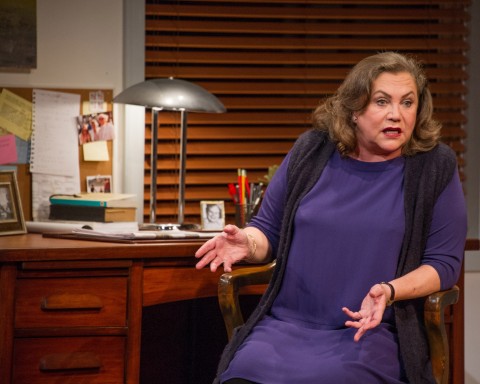 One of the failings of human beings is the hesitance to visit those who have lost loved ones. We wonder about the right thing to say when the actual requirement is to be present and to listen. That’s all that’s asked of audience members for “The Year of Magical Thinking,” Joan Didion’s adaptation of her own award-winning memoir into a one-woman play, now at Arena Stage.
One of the failings of human beings is the hesitance to visit those who have lost loved ones. We wonder about the right thing to say when the actual requirement is to be present and to listen. That’s all that’s asked of audience members for “The Year of Magical Thinking,” Joan Didion’s adaptation of her own award-winning memoir into a one-woman play, now at Arena Stage.
Making it more of an enticement is that it is told by Kathleen Turner, she of the nuanced, expressive voice who has been a repeat performer at Arena.
On a wide comfortable set in which she sits, makes tea or paces, she lays out her surprising and painful year of late 2003 when she lost her husband of a heart attack at 71 — a shocking enough occurrence even though one knows it’s around the corner for all — but also their only child, an adult daughter beset with her own ailment who was unconscious when her father died, so that the funeral had to wait.
“It seems like a long time ago,” her character says at the outset of recounting her ordeal. “It won’t be when it happens to you, and it will.”
Yet the monologue, which includes the death of the daughter more than a year later, isn’t mournful. Turner instead is animated by realization. Learning something from these hard lessons have given her a knowledge that even makes her smile more than appear to give way to tears. Part of that is Turner’s approach — with the grit in her honeyed, familiar voice that shows insight that comes with age and experience.
Yet there are things we learn about this family that are almost between the lines of Didion’s well chosen prose. They didn’t seem particularly natural parents; each was too busy with their own writing to know exactly what to do with the daughter they eccentrically named Quintana Roo. And while they seemed like amiable partners, who had settled into routines of writing and hearth and drink, she and her husband John Gregory Dunne seemed too in their heads to make as strong an emotional connection as they could.
And as comfortably affluent a lifestyle that a couple of writers could have — with movie script contracts and houses in Malibu, New York and Maui — there is a leveling that comes with the inevitability of death.
Didion devised the script from her own text, which won the National Book Award more than a decade ago. That required some editing, but a full night of “The Year of Magical Thinking” might have benefitted from a bit more. Still, it’s the kind of thing that audiences sit rapt to hear in the cocoon of the soundless Kogod Cradle at the Mead Center for American Theater. That may be due to the intimate setting, the piercing personal words of Didion or the performance by Turner, who even when she makes a couple of flubs on an opening night performance might do so in service of the character, who is still emotionally healing and could naturally be flailing for words at point.
The one-person play continues to be a wonder to witness — how does one keep all of this in mind with the lack of cues and give and take that’s provided by other cast members? For Turner, the nightly telling must be something of a ritual incantation as well — telling oneself a truth over and over as a reminder and a guidepost (the actress lost her own mother last year).
The set by Daniel Zimmerman doesn’t get old, perhaps because it is so well appointed. The lighting by Jesse Belsky is subtle and effective as it brightens and lowers its wattage at points. And using a follow spotlight only adds to the star appeal of the central player. Roc Lee’s sound design has the waves gently crashing in and out for scenes transported west.
On Broadway, it was Vanessa Redgrave to took the role in a production of “The Year of Magical Thinking” directed by David Hare. It has since become a showcase piece around the world because of its universality. As in those cases, Turner’s embodiment of the role in Washington is not to be avoided at all, but experienced and shared.
“The Year of Magical Thinking” continues through Nov. 20 at Arena Stage, Washington, D.C.